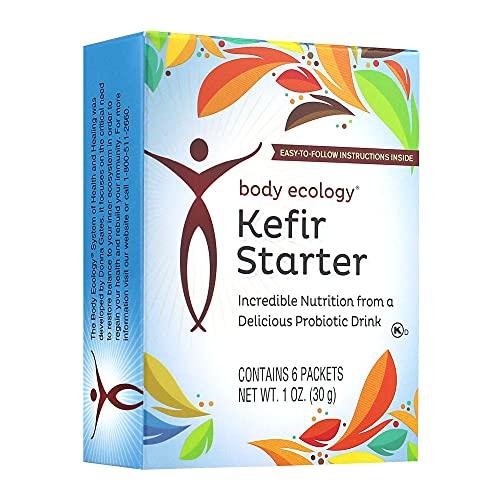Description
- KEFIR STARTER Ancient cultured food rich in amino acids, enzymes, calcium, magnesium, phosphorus and B vitamins.
- BODY ECOLOGYS KEFIR PROBIOTIC is safe and easy to use.
- LONG LASTING Contains six packets which can be used on average of seven times each.
- GUT HEALTH AND BALANCE May restore balance to the digestive tract after antibiotic use.
- BODY ECOLOGY is a family-owned company that believes a holistic lifestyle is a clear path to good physical and mental health. We believe that our system helps to restore and maintain the inner ecology of your body.
Kefir has many benefits including better digestion of fats, proteins and carbohydrates, and has been known for thousands of years for its anti-aging and immune enhancing properties. It's an ancient cultured food rich in amino acids, enzymes, calcium, magnesium, phosphorus and B vitamins. Appropriately named "feel good" in Turkish - that's exactly how you'll feel after drinking a glass in the morning! Easy and fun to make at home, it is superior to commercial yogurt. An absolute must after antibiotic use! To activate starter for initial usage: Into container (preferably glass with lid), mix together the entire contents of one foil starter package and one quart of slightly warmed milk** (about skin temperature or 92 degrees). Shake, stir or whip with a whisk to mix well. Put lid on container. Let this mixture ferment at 72-75 F for 18-24 hours for milk, 24-48 hours for coconut water and some others. (You will notice it is ready if the milk has thickened and has a distinctive, sour fragrance. Final consistency is pourable but not ""eat with a spoon"" thick.) Coconut water will not thicken like milk, only become cloudy and much less sweet. Shake or stir vigorously and place into the refrigerator. Even in your refrigerator the fermentation process continues, but chilling will slow down the fermentation of the healthy bacteria and beneficial yeast. Directions for transferring after the initial batch has been made and directions for making kefir cheese are included on packaging. **While traditionally made with cow's milk, it can be made with soy, coconut, rice, goat, or sheep milk (other varieties of milk yield a more watery version than cow's milk).










